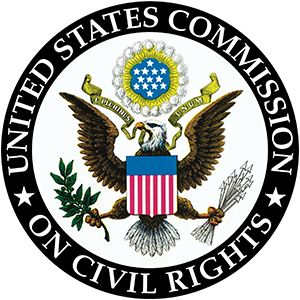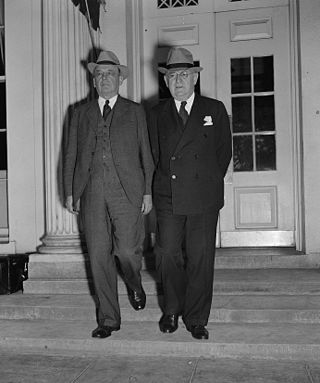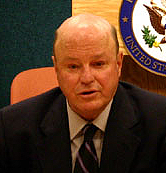
The United States Intelligence Community (IC) is a group of separate U.S. federal government intelligence agencies and subordinate organizations that work both separately and collectively to conduct intelligence activities which support the foreign policy and national security interests of the United States. Member organizations of the IC include intelligence agencies, military intelligence, and civilian intelligence and analysis offices within federal executive departments.

The National Security Archive is a 501(c)(3) non-governmental, non-profit research and archival institution located on the campus of the George Washington University in Washington, D.C. Founded in 1985 to check rising government secrecy, the National Security Archive is an investigative journalism center, open government advocate, international affairs research institute, and the largest repository of declassified U.S. documents outside the federal government. In the four decades of its history, the National Security Archive has spurred the declassification of more than 15 million pages of government documents by being the leading non-profit user of the U.S. Freedom of Information Act (FOIA), filing a total of more than 70,000 FOIA and declassification requests.
The Association for Information Science and Technology (ASIS&T) is a nonprofit membership organization for information professionals that sponsors an annual conference as well as several serial publications, including the Journal of the Association for Information Science and Technology (JASIST). The organization provides administration and communications support for its various divisions, known as special-interest groups or SIGs; provides administration for geographically defined chapters; connects job seekers with potential employers; and provides organizational support for continuing education programs for information professionals.

The U.S. Commission on Civil Rights (CCR) is a bipartisan, independent commission of the United States federal government, created by the Civil Rights Act of 1957 during the Eisenhower administration, that is charged with the responsibility for investigating, reporting on, and making recommendations concerning civil rights issues in the United States. Specifically, the CCR investigates allegations of discrimination based on race, sex, national origin, disability. In March 2023, Rochelle Mercedes Garza was appointed to serve as Chair of the CCR. She is the youngest person to be appointed to the position.

The United States President's Commission on CIA Activities within the United States was ordained by President Gerald Ford in 1975 to investigate the activities of the Central Intelligence Agency and other intelligence agencies within the United States. The Presidential Commission was led by Vice President Nelson Rockefeller, from whom it gained the nickname the Rockefeller Commission.

The President's Committee on Administrative Management, commonly known as the Brownlow Committee or Brownlow Commission, was a presidentially-commissioned panel of political science and public administration experts that in 1937 recommended sweeping changes to the executive branch of the United States government. The committee had three members: Louis Brownlow, Charles Merriam, and Luther Gulick. The staff work was managed by Joseph P. Harris, director of research for the committee.

The National Science Board (NSB) of the United States establishes the policies of the National Science Foundation (NSF) within the framework of applicable national policies set forth by the president and the Congress. The NSB also serves as an independent policy advisory body to the president and Congress on science and engineering research and education issues. The board has a statutory obligation to "...render to the President and to the Congress reports on specific, individual policy matters related to science and engineering and education in science engineering, as Congress or the President determines the need for such reports,". All board members are presidential appointees. NSF's director serves as an ex officio 25th member and is appointed by the president and confirmed by the US Senate.

Frank George Wisner II is an American businessman and former diplomat who served as United States Secretary of State following the resignation of the previous acting United States Secretary of State Arnold Kanter at noon on January 20, 1993 until the confirmation by the United States Senate and swearing in of Warren Christopher as United States Secretary of State later that day. He is the son of CIA official Frank Wisner (1909–1965). On January 31, 2011, he was sent to Egypt by President Barack Obama to negotiate a resolution to the popular protests against the regime that had swept the country. A White House spokesman said that Wisner had vast experience in the region as well as close relationships with many Egyptians in and out of government. The New York Times reported that he was a personal friend of former Egyptian president Hosni Mubarak.

The White House Conference on Aging (WHCoA) is a once-a-decade conference sponsored by the Executive Office of the President of the United States which makes policy recommendations to the president and Congress regarding the aged. The first of its kind, the goals of the conference are to promote the dignity, health and economic security of older Americans. It has been claimed that it is perhaps the best-known White House conference. The conference is held once a decade, with the most recent conference held in 2015, in preparation for the retirement of the baby boomer generation.

The Institute of Museum and Library Services (IMLS) is an independent agency of the United States federal government established in 1996. It is the main source of federal support for libraries and museums within the United States, having the mission to advance, support, and empower America’s museums, libraries, and related organizations through grantmaking, research, and policy development.” In fiscal year 2023, IMLS had a budget of $313.58 million. As of 2023, IMLS currently has 70 full-time employees, many of whom still work remotely. In 2022, the employees voted to unionize, joining hundreds of thousands of federal workers who have joined the American Federation of Government Employees (AFGE) to “build power and have a voice at work.”
Charles Benton was an American executive who served as the CEO and Chairman of the Board of the Benton Foundation and former CEO of Public Media Incorporated, a film and video publisher and distributor.

Robert Sidney Martin is an American librarian, archivist, administrator, and educator. He is Professor Emeritus, School of Library and Information Studies, Texas Woman’s University, where he was the Lillian M. Bradshaw Endowed Chair until his retirement in 2008.

Bessie Grace Boehm Moore was an American educator from Arkansas. She was a lifelong advocate to increase funding and support for libraries and served on the Arkansas Library Commission for 38 years. In 1999, American Libraries named her one of the "100 Most Important Leaders We Had in the 20th Century".

The White House Initiative on Educational Excellence for Hispanics is a multi-agency working group within the Department of Education charged with strengthening the nation's capacity to provide high-quality education while increasing opportunities for Hispanic American participation in federal education programs. In addition, the Initiative serves as a resource for information related to closing the educational achievement gap for Hispanic Americans. Finally, the Initiative provides staffing to support and coordinate the mission of a President's Advisory Commission on Educational Excellence for Hispanics.

Elmer Boyd Staats was an American public servant whose career from the late 1930s to the early 1980s was primarily associated with the Bureau of the Budget (BOB) and the GAO. Staats was born to Wesley F. and Maude (Goodall) Staats. Staats received his AB from McPherson College in 1935, his MA from the University of Kansas in 1936, and his Ph.D. from the University of Minnesota in 1939.

The Networking and Information Technology Research and Development (NITRD) program consists of a group of U.S. federal agencies to research and develop information technology (IT) capabilities to empower Federal missions; support U.S. science, engineering, and technology leadership; and bolster U.S. economic competitiveness.

The White House Initiative on Asian Americans, Native Hawaiians, and Pacific Islanders (WHIAANHPI) is a United States governmental office that coordinates an ambitious whole-of-government approach to advance equity, justice, and opportunity for Asian Americans, Native Hawaiians, and Pacific Islanders. The Initiative collaborates with the Deputy Assistant to the President and AA and NHPI Senior Liaison, White House Office of Public Engagement and designated federal departments and agencies to advance equity, justice, and opportunity for AA and NHPIs in the areas of economic development, education, health and human services, housing, environment, arts, agriculture, labor and employment, transportation, justice, veterans affairs, and community development.
The following is a timeline of the presidency of Jimmy Carter, from January 1, 1979 to December 31, 1979.
The following is a timeline of the presidency of Jimmy Carter, from January 1, 1980, to January 20, 1981.
















